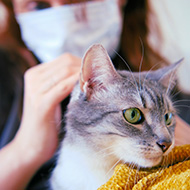
Felines are the first pets in the US to test positive for SARS-CoV-2.
Two pet cats living in New York have tested positive for SARS-CoV-2, the virus responsible for COVID-19, US Officials have confirmed.
The cats both had mild respiratory illness and are expected to make a full recovery, said the US Centres for Disease Control and Prevention (CDC).
It is believed the cats developed the illness from mildly ill or asymptomatic household members, or through contact with an infected person outside their home.
The news comes after four more tigers and three lions tested positive for COVID-19 at the Bronx Zoo. But US authorities stress there is no evidence that animals play a role in spreading the virus.
'Public health officials are still learning about SARS-CoV-2, but there is no evidence that pets play a role in spreading the virus in the United States,' the CDC writes. 'There is no justification in taking measures against companion animals that may compromise their welfare. Further studies are needed to understand if and how different animals, including pets, could be affected.'
Nevertheless, the CDC is recommending that pet owners do not let their animals interact with people or other animals outside the household.
The pet cats lived in two separate areas of New York State and are the first pets in the US to test positive for SARS-CoV-2.
To date, SARS-CoV-2 infections have been reported in a tiny number of animals across the globe, and mostly in cases where an animal has had direct contact with a person infected with the virus.
The BVA said in a statement: “From the small number of cases it appears that dogs do not show symptoms, but cats can show clinical signs of the disease.
“It is also the case that animals can act as fomites, as the virus could be on their fur in the same way it is on other surfaces, such as tables and doorknobs. That’s why our main advice for pet owners continues to be to practise good hand hygiene.
“And, as a precaution, for pet owners who have COVID-19 or who are self-isolating, we are recommending that you keep your cat indoors if possible, during that time.”



 The Veterinary Medicines Directorate (VMD) is inviting applications from veterinary students to attend a one-week extramural studies (EMS) placement in July 2026.
The Veterinary Medicines Directorate (VMD) is inviting applications from veterinary students to attend a one-week extramural studies (EMS) placement in July 2026.